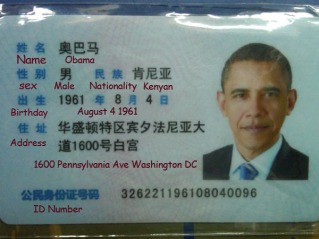
Homeless tunnel docile
Foreign travelers fluent in Chinese and those that are not both find that getting accommodations in China is among the most difficult of tasks in this country. Each city has hundreds of hotels, hostels, and inns, some of which are extremely cheap and most convenient; however, as a foreigner, you are only allowed to stay in a select/limited number of them (and these can be the more expensive, less convenient choices). Hotels in China are required to meet certain criteria before they receive accreditation from the authorities to welcome foreign guests (外宾 wài bīn). Not only is the law bad for business, it is discriminatory and arbitrary in nature!
This regulation is so arbitrary, it has travelers from Taiwan and Hong Kong even confused as to what it means. The phrase “可否接待外宾的酒店” means “can/cannot receive foreign guests at this hotel” is a phrase you will want to check for when using the hotel’s booking services online (mind you, only a few hotels mention this upfront). Let us take a look at some basic criteria for the law:
- To become a hotel for foreigners is a serious matter, requiring application by the hotel’s company to the Public Security Department; however, the hotel needs the right equipment provided to guests. Hardware such as international calling service, international television channels, Chinese/English menus, Chinese/English signs, etc. and software such as staff that speak both Chinese and English, hold a bachelor’s degree, and are capable of welcoming foreign guests, are all required.
- If a hotel does not meet these requirements, they can only serve domestic guests. In this case, there is no need for the hotel to provide the above provisions.
- The hotels registries are regularly sent to the Public Security to the departments that check all registries; if a foreign guest is found having stayed at a domestic hotel, the hotel will receive punishment. This is because it is illegal for foreign guests to stay at the domestic hotels.
(Some speculate that the issuing of approval from the Public Security Department to the hotels is more based on building safety, cleanliness, clearance of access, fire safety, etc. It is likely to be a mix of these rules and building code.)
How is this discriminatory/arbitrary in nature?

Obama’s Chinese ID!
Much of what is required by law seems to be positive. The law pushes businesses to meet the demands of the international community (largely forcing students to learn English to enter the work force and to increase China’s service standards); however, what if a foreigner can speak Chinese and doesn’t require English-speaking staff or food menus in English? Too bad, because the hotel cannot enter your passport into the registry or else the Public Security will punish the business. Without a Chinese ID number, you will be promptly rejected, even if you booked online days in advance. (An awkward situation because the staff knows you speak Mandarin, yet the reason they must reject you is because they can’t communicate with a foreigner using English).
Furthermore, hotels that do permit foreign guests sometimes do not fully meet the requirements as stated above. This is either because they have received approval due to corruption or they blatantly break the law. There is also the possibility that gaps exist in the issuing of these “foreign guest licenses” where the issuing department did not do a gthorough job at checking the hotel’s qualifications (blanket approvals). What is most perplexing is how some of China’s largest chain hotels such as 七天酒店 (qī tiān jiǔ diàn 7 Days Hotel) and 如家酒店 (rú jiā jiǔ diàn Home Inn) vary on approval–there could be two Home Inns on opposite sides of the street from each other, one allows foreign travelers and the other might not! Who in the world knows why, even they can’t explain it!
Solution
Even if you are a “global adventurer” and like to follow the unbeaten path, it is very difficult to do so in China. You are safer booking a bed at an international hostel or a room at a hotel designed for foreigners. The other alternative is to travel with local friends that can use their Chinese ID to book the room on your behalf. It just isn’t worth the gamble of booking days in advance, arriving late at night to the hotel, and then being rejected when all the other hotels in the city are already booked (speaking from personal experience). Try begging, but most hotel managers today are aware of the harsh punishments associated with breaking this law and will not budge. If you are lucky, the boss will be gone that day and the employee at the counter will be ignorant to the regulation.
Although the Chinese government’s intentions are good, with the aim of raising standards, they are unaware of the deeply negative consequences they have caused to foreign travelers within the country and to businesses that must turn away guests. Let’s hope they change this soon, and please take my advice because you may end up with nowhere to stay in an unfamiliar city.

